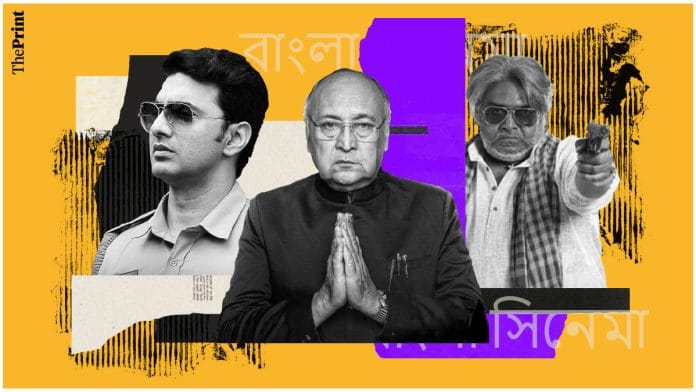Kolkata: Political corruption scandals, the threat of Islamic radicalisation, and predatory Sundarbans strongmen—these are some of the hot-button issues gripping West Bengal as it gears up for the 2024 Lok Sabha elections. But these topics are also thrilling audiences in darkened cinema halls. A wave of Bengali films is tackling the very same issues that the state’s news media endlessly debates as national elections approach.
First came Raktabeej (Seeds of Blood), released in October 2023. Starring Trinamool Congress MP Mimi Chakraborty, this political-family drama set in Burdwan delves into the theme of homegrown terror plots (it calls itself a story of “demons in disguise”) and features a Bengali President modelled after Pranab Mukherjee. It was a box office success.
Following closely on its heels was Pradhan, which has been playing to packed halls since its December release. It too stars a TMC leader, Dev Adhikari, and tells the story of an upright cop, Deepak Pradhan, who battles corruption in the backwaters of north Bengal, a region where the BJP, incidentally, made significant gains in the 2019 Lok Sabha elections. When Adhikari’s Pradhan arrives on his posting, the smiling local politician asks, “Have we made him a good offer yet?” Although the makers claim it’s supposed to be pure entertainment, the film manages to connect back to TMC’s own political battles, even as it reflects some of Pradhan’s integrity onto Adhikari himself.
The Trinamool Congress is trying to give itself a clean slate by making its own MPs do such films. It is as if the government is trying to say if we were indeed guilty, would our MP-actors have been in such films?
-Sharmi Adhikary, film critic
Finally, there’s Bonbibi, due to hit cinemas on 8 March. Here, the filmmakers seem to have possessed a crystal ball. Although the film was made well before protests and controversy erupted around Sandeshkhali’s Trinamool Congress strongman Sheikh Shahjahan, now under arrest, its villain Jehangir and the widows he torments bear striking parallels to recent news reports.
“Bengalis are passionate about both their cinema and their politics,” Bonbibi producer Rana Sarkar told ThePrint. How can the two not rub off on each other as we get ready to vote in the big election?”
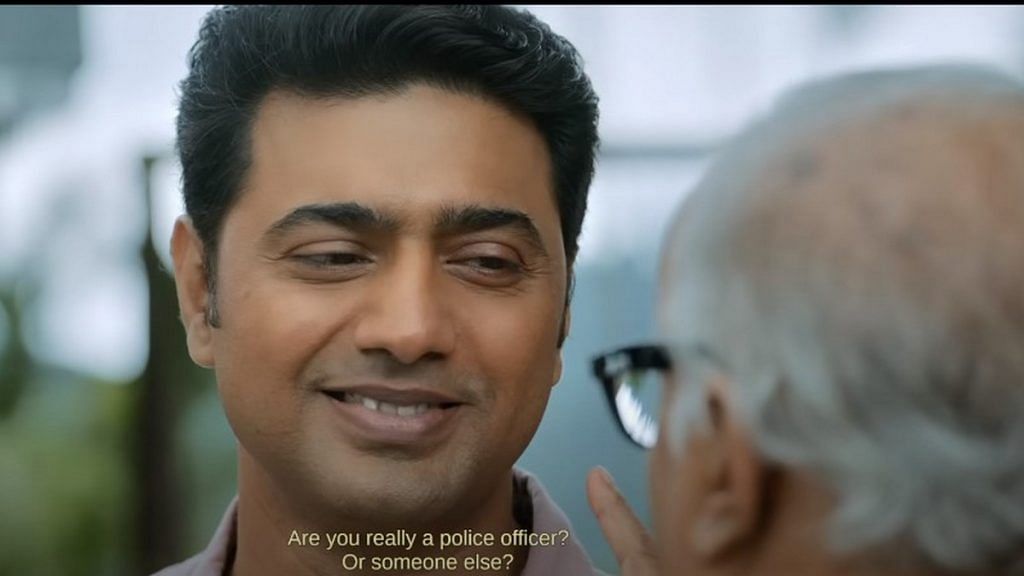
Also Read: Anurag Kashyap is wrong, Bengali cinema isn’t ‘ghatiya’. But dubbed Pushpa, KGF are winning
Good and evil, Centre and state
Raktabeej jolted viewers with a blast from the past. The film was a semi-fictionalised revisit of a real-life drama that unfolded in West Bengal’s Burdwan district nine years ago, almost to the day of its release. The incident, still hotly debated and a source of unease, involved an explosion on the Ashtami of Durga Puja in 2014.
At around noon that day, an explosion ripped through a house in Burdwan’s nondescript Khagragarh locality, killing two people and injuring another. Investigations revealed the victims were members of the terrorist outfit Jamaat-ul-Mujahideen Bangladesh (JMB), and the explosion stemmed from an improvised explosive device they were constructing. The incident grabbed national headlines for a couple of other reasons too.

One was that then President Pranab Mukherjee was celebrating the festival with his family just minutes away from the “terror den”. The other was a major political firestorm around the incident with the BJP’s Amit Shah accusing the TMC of shielding the guilty. Nineteen people were convicted in 2019, with JMB handler Md Musa being sentenced to life in 2022.
Raktabeej artfully mirrors many of these elements, giving them its own spin. The film utilises Durga Puja to establish a clear conflict between good and evil. And one of its central characters is a President (played by Victor Banerjee) visiting his sister in Burdwan. Much like the Afzal Guru case, the President is also portrayed rejecting the mercy petition of a Muslim man sentenced to death for terrorism, leading to a revenge terror plot to kill him in his native village.
Director Shiboprosad Mukherjee, in an interview with the Telegraph, said that the idea for the film came from a newspaper article. “The journalist wrote that the President spent Durga Puja in terror, hiding. There were a lot of theories around the Khagragarh blast. One of the articles asked if it was just a blast or something else,” said Mukherjee. “That got us thinking. We immediately thought of developing a story.”
The film got people talking not just about the 2014 incident, but also about allegations of growing radicalisation within a certain section of the Muslim population in West Bengal—an issue that the opposition BJP constantly harps on.
Adding another layer of intrigue was the casting of former TMC MP Mimi Chakraborty. She plays a cop investigating the plot, but clashes with another officer, Pankaj Sinha (played by Abir Chatterjee), parachuted in from Delhi. “The mission is only possible if the Centre and state work together,” the Delhi cop advises her in one scene. By the film’s climax, they’ve overcome their differences and joined forces.
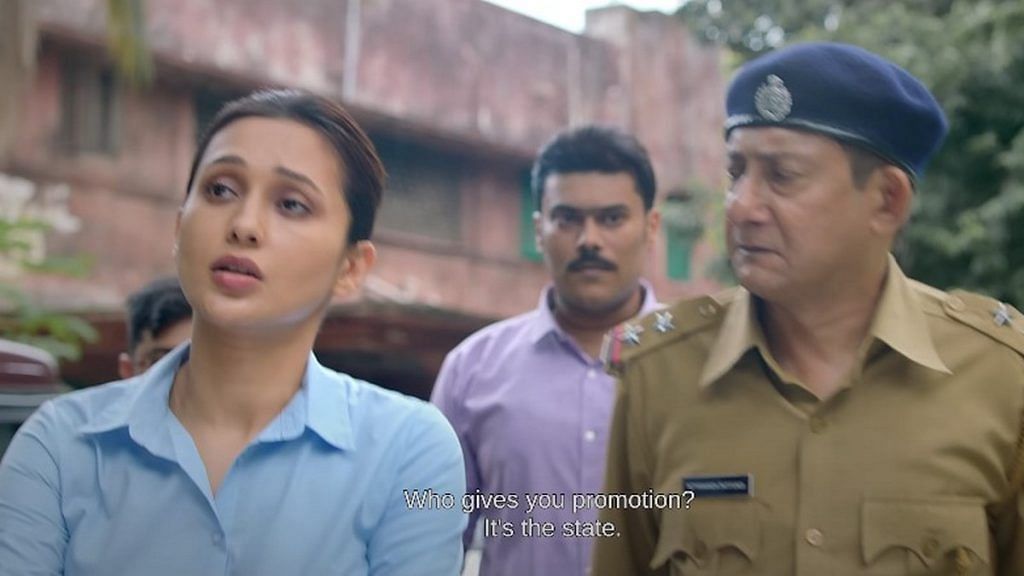
Scams and strongmen
If Raktabeej is a throwback to what was happening in Bengal a decade ago, Pradhan and the upcoming film Bonbibi seem to reflect some of the more current allegations haunting the ruling Mamata Banerjee-led Trinamool Congress.
Dev Adhikari-starrer Pradhan is the story of a gutsy cop who is determined to clean up a small North Bengal town plagued by corruption and intimidation, much of it wreaked by a local politician who uses violence to maintain his reign of terror. The film alludes to several controversies and allegations surrounding the TMC, including education scams, land grabs, and vote-rigging during panchayat polls. The events depicted in the film especially bring to mind the 2021 post-Assembly election violence in West Bengal and the panchayat poll clashes that resulted in several casualties last July.
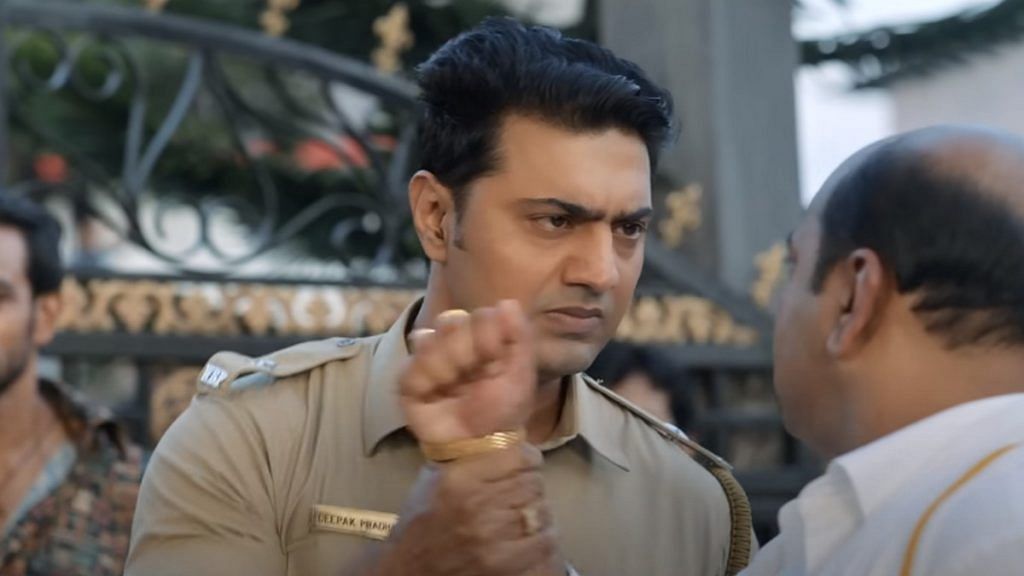
Adhikari, the Trinamool Congress MP from the Ghatal constituency who has himself been questioned by the Enforcement Directorate in connection with a money laundering case linked to a cattle smuggling scam, has stated in numerous interviews that Pradhan is not associated with any political party and merely highlights the issues faced by ordinary citizens. “I don’t mix cinema with politics,” he said in one interview. “No political message has been given… This is not a propaganda film.”
Not everyone is convinced. Film critic Sharmi Adhikary argues that starring in political films that seem critical of the Trinamool Congress is a smart move for party leaders like Chakraborty and Adhikari.
“The Trinamool Congress is trying to give itself a clean slate by making its own MPs do such films,” Adhikary contended. “It is as if the government is trying to say if we were indeed guilty, would our MP-actors have been in such films?”
Writers and directors must ensure such films don’t become propaganda and give Bengali cinema a bad name.
-Bhaswati Ghosh, film critic
Such films also help the TMC portray itself as democratic, Adhikary added: “It’s trying to show there is freedom of expression in West Bengal as no one stops such films from being made even if they show the very issues that the state government is defensive about.”
A new film Bonbibi, scheduled to release on 8 March, has no such Trinamool MPs trying to make a point. However, it shares uncanny similarities with the land grab and sexual assault allegations against Sheikh Shahjahan, a TMC ‘strongman’ in Sandeshkhali village, located in the Sundarbans region.
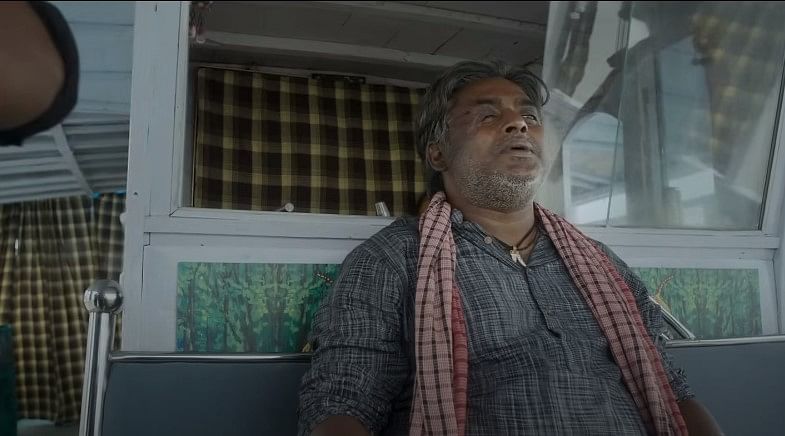
Set against the lush backdrop of the Sundarbans, Bonbibi uses a combination of myth and contemporary drama to highlight the struggles and triumphs of ‘tiger widows’—women who are cast out of society after losing their spouses in tiger attacks. The villain of the piece is local gang leader, Jehangir, who exploits them under the pretence of offering protection.
Bonbibi producer Rana Sarkar earlier told ThePrint such parallels are inevitable, as the film is coming out at a time when Sandeshkhali has made national news. “The film was written and shot much before the events of Sandeshkhali unfolded,” he said. “This is like Valmiki writing the Ramayana before the advent of Ram!”
Also Read: Kadak Singh’s Aniruddha Roy Chowdhury taking Bengali cinema beyond Bengal
‘Such films shouldn’t become propaganda’
Films mirroring the political realities of the day are not a new phenomenon. Indeed, it’s a tradition in Bengal.
Film publicist Indranil Roy pointed to Ritwik Ghatak’s 1961 film Komal Gandhar (A Soft Note on a Sharp Scale), an exploration of Partition, idealism, and societal corruption; Satyajit Ray’s 1980 outing Hirak Rajar Deshe (In the Land of the Diamond King), where a king brainwashes his subjects with rhyming slogans; and Anik Dutta’s 2019 satire Bhobishyoter Bhoot (Ghosts of the Future).
“The three new films, Raktabeej, Pradhan, and Bonbibi are not a new trend in Bengali cinema, but an interesting one nonetheless with national elections in 2024,” Roy said.
However, there’s been resistance to some political films. Theatres were prevented from showing Bhobishyoter Bhoot after its release, citing “orders from upper management”. The film portrays Kolkata ghosts, rendered homeless by decrepit buildings demolished for swanky malls, taking shelter in a refugee camp. It’s also packed with political punchlines aimed across the spectrum.
The Mamata Banerjee government faced criticism for allegedly pressuring theatres to pull the film unofficially, but Sarkar pointed out that this should not have surprised anyone. “If you want to make a political film do so with a degree of subtlety so that it doesn’t directly point fingers at a particular government,” he said.
The new films, however, haven’t faced any such issues with the administration. “In the months to come, more such films are coming,” predicted film critic Bhaswati Ghosh. “If done well, they will attract audiences to theatres like Raktabeej and Pradhan. But writers and directors must ensure such films don’t become propaganda and give Bengali cinema a bad name.”
(Edited by Asavari Singh)



